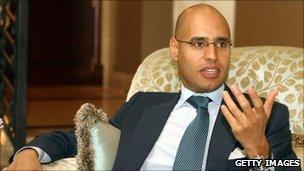LSE criticised for links with Gaddafi regime in Libya
- Published

The London School of Economics has been heavily criticised for a "chapter of failures" in its links with the Gaddafi regime in Libya.
A report by former Lord Chief Justice Lord Woolf says mistakes and errors of judgement damaged the LSE's reputation.
The school's director, Sir Howard Davies, resigned in March over a £1.5m gift from a foundation led by Colonel Gaddafi's son Saif, a former student.
The LSE says it accepts all Lord Woolf's recommendations.
The LSE's centre for global governance had received £300,000 of the donation from the Gaddafi International Charity and Development Foundation, when Lord Woolf was appointed to head the independent external inquiry in March 2011.
The LSE's commercial arm had also secured a contract worth £2.2m to train Libyan civil servants.
Lord Woolf's remit was to look at how the LSE came to ignore warnings and risk its reputation by forging close links with the former Gaddafi regime.
The institution's involvement with Libya caused embarrassment at the time of the Libyan uprising in February and led students there to stage a protest.
'Significant risk'
Lord Woolf says LSE's links with Libya exposed it to a "significant degree of risk" which would have been missed, had the Gaddafi regime not collapsed.
He says links between the LSE and Libya were allowed to grow unchecked, without due diligence assessments taking place.
He describes what he calls a "chapter of failures" in the way the proposed donation was scrutinised by the LSE's council, saying that due diligence "remained at best embryonic".
"The actual source of money gifted... was never established", the report says, and "Saif Gaddafi's word alone was relied upon."
He also concludes that the timing of the donation, six weeks after Saif Gaddafi was awarded a PhD, was "unfortunate", "risky", "indicative of naivety at the LSE" and gave the impression that Saif had "purchased his degree".
Lord Woolf says academics and staff acted in, what they perceived to be the best interests of the School, but the donation would not have been accepted if its source had been properly checked.
He singles out Sir Howard Davies for criticism, concluding that "despite his great experience and ability, responsibility for what went wrong must rest with the [former] director."
He also blames LSE administrators Fiona Kirk and Adrian Hall for their roles in the affair and the former head of the centre for global governance, Professor David Held, who was closely involved in supervising Saif Gaddafi's PhD work and in securing the donation.
Professor Held announced he was leaving the LSE last month.
PhD studies
The report also says that Saif al-Islam Gaddafi "duped" his academic supervisors by receiving extensive outside help in preparing his PhD thesis.
It says he was admitted to study at the LSE's philosophy department in 2003 because of an "idealism factor" that he might improve Libya - even though he had already been rejected by other LSE departments on the basis that his academic standards were not sufficiently high.
A separate University of London panel has been investigating allegations that Saif Gaddafi's PhD thesis might contain plagiarism or have been ghostwritten.
LSE director, Professor Judith Rees: "We refused to take any money while he was a student and that is a very very strict policy"
That report is not being made public but BBC News understands that it will not recommend that Gaddafi be stripped of his LSE doctorate.
Lord Woolf makes 15 recommendations in his report.
These include setting up an ethics code to govern potential risks to the LSE's reputation and the installation of a new body to oversee the admission of postgraduate students and their studies.
He also calls for new guidance on the amount of outside assistance a postgraduate student can receive and new policies on donations to the School.
LSE director Professor Judith Rees said: "The publication of this report will help LSE move on from this unhappy chapter in its otherwise celebrated history.
"It is consoling that Lord Woolf finds that no academic or other staff member at LSE acted other than in what they perceived to be the best interests of the School.
"He also describes the work of LSE Enterprise in training Libyan professionals and civil servants as of merit. We will now work to take LSE forward, learning the lessons of the report and implementing Lord Woolf's recommendations."
- Published22 February 2011
- Published23 February 2011
- Published1 March 2011